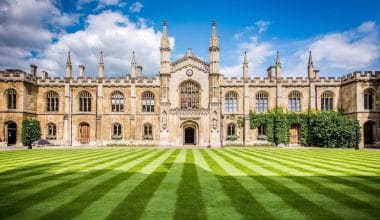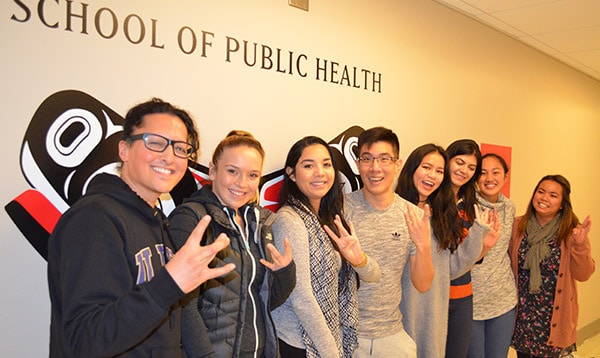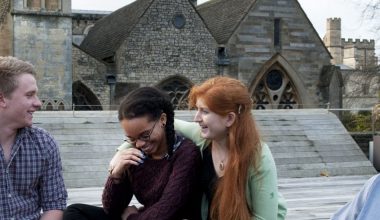Did you know that community colleges help students prepare for the workforce? Like a nursery bed where seeds are groomed before being transferred to the farmland, community colleges are preparatory grounds for a four-year degree program in universities.
Interestingly, Atlanta is home to some of the best community colleges.
It is a known fact that when faced with different options, it is usually a hard decision to make a choice. We understand this plight and have put together an analysis of the Best Community Colleges in Atlanta.
Accurate information on each of these schools is found in this post. So, you will find the best college that suits your immediate and long-term needs.
Table of contents
- What Is A Community College?
- How Expensive Community College In Atlanta, Georgia
- How Long Does It Take To Study At A Community College In Atlanta?
- What are the differences between a Community College and a University?
- The Best Atlanta Community Colleges in 2024
- #1. The Art Institute of Atlanta
- #2. Atlanta Metropolitan State College
- #3. Atlanta Technical College
- #4. Bauder College
- #5. Brown College of Court Reporting
- #6. Brown Mackie-College, Atlanta
- #7. Herzing University Atlanta
- #8. Interactive College of Technology-Chamblee
- #9. Sanford Brown College, Atlanta
- #10. Gwinnett Community College
- #11. Lanier Technical College
- #12. Georgia Perimeter College
- #13. Oglethorpe University
- #14. Southern Crescent Technical College
- #15. Georgia Piedmont Technical College
- Conclusion
- FAQs on the Best Community Colleges in Atlanta, Georgia
- References
- Recommendations
What Is A Community College?
A community college, sometimes called junior college, is an educational institution. It is a two-year school that offers affordable postsecondary education as a prerequisite to a four-year degree.
In the early 20th-century, community colleges were established so that a more skilled workforce could make the economy stronger.
There was an increase in enrollment in high schools, and extra higher education prospects were necessary.
These community colleges give associate degrees, certificate programs, developmental courses, and vocational programs. Also, they offer distance learning opportunities, flexible scheduling, and childcare.
These community colleges provide lots of different options to postsecondary students. Some of these options are:
Also, these junior colleges serve as a pathway to a university. This is because community colleges have accreditation and students can quickly transfer between a community college and a university.
The cost of attending a community college is low when compared to a four-year college. Hence, the median price of studying at a public community college is $2,713 a year, while the average cost of attending a public university is $7,605 yearly. Huge difference, right?
Also, most community colleges offer technical or vocational training for international students. This is to enable them to develop their skills.
Additionally, these junior colleges partner with industries to make sure that students have proper preparation for jobs that need higher education or workforce training. This will help to increase workforce development strategies, job training programs, and job placements.
How Expensive Community College In Atlanta, Georgia
The average tuition for Atlanta community colleges is almost $3,413 a year; in-state students and out-of-state students pay $7,181, while the average tuition for private community colleges in Atlanta, Georgia is approximately $14,834 annually.
Young Harris College has the highest tuition, with an average tuition of $26,386 per year. In contrast, Heart of Georgia Technical College has the lowest tuition in Atlanta, GA., with a yearly tuition of $3,293.
Read also: 17+ Cheapest Colleges in Atlanta; Tuition & Acceptance Rate
How Long Does It Take To Study At A Community College In Atlanta?
A degree or certificate from a community college should not take more than two years. The most symbolic degree available is usually the associate degree, which needs two years or four semesters to earn. Other standard programs include certificate and workforce training programs, which take a year at most and sometimes even less than that.
Family emergencies, work obligations, and financial problems can all serve as significant disruptions to your academic goals.
In some cases, deciding to stay longer than two years in a community college is intentional. Part-time study is a popular decision among community college students, with about 62% of all students choosing this option.
Moreover, a standard associate’s degree comprises of 60-80 credits. Full-time students usually take around 15 credits per semester, which allows them to complete the program in two years.
On the other hand, part-time students take 10 credits per semester and always take even fewer than that. This implies that it could take six or seven years to finally earn the required number of credits for an associate’s degree.
What are the differences between a Community College and a University?
Firstly, Community colleges offer associate degree programs that you can complete in two years or less. This, however, depends on whether you’re a full or part-time student.
Universities offer programs that lead to bachelor’s, master’s and doctorate degrees, which take longer to complete. Both community colleges and universities offer different types of programs, but universities usually have a much more extensive range of options. Most times, they have smaller colleges within them. For example, the College of Education, College of Performing Arts etc.
Secondly, universities tend to have bigger class sizes due to the number of students attending the school. While Community colleges usually have smaller class sizes because of their much lower overall student population.
Community colleges typically have much less strict admission requirements than universities. In short, any person who graduates from high school and applies to a community college gets admitted.
Admission to universities tend to involve a lot of processes. The admission requirements might typically involve taking specific courses and earning certain grades in high school, completing essay questions, having a minimum score on the ACT or SAT.
Finally, community colleges are pretty cheaper than universities. According to the College Board, the average cost of tuition and fees each year for a public 2-year college is $3,440 for in-district students.
Also, the average annual tuition for a public 4-year university is $9,410 for in-state students and $23,890 for out-of-state students.
The Best Atlanta Community Colleges in 2024
List of the best community colleges in Atlanta, Georgia
The World Scholarship Forum has put together a list of the best community colleges in Atlanta that offer associate degrees, certificate programs, and vocational training for you.
The best Atlanta, GA community colleges were selected based on acceptance rate, student-faculty ratio, number of programs, graduation rate, tuition fees, our data from reliable government sources, student surveys, college graduate interviews, and editorial review.
So, based on these criteria, here is a list of the best community colleges in Atlanta, Georgia:
#1. The Art Institute of Atlanta
The Art Institute of Atlanta is a private, for-profit institution of creative professional studies in Atlanta, Georgia. It belongs to the Education Principle Foundation. This community college in Atlanta, GA prepare students for careers in design, media arts, and culinary arts.
Also, this college has a total enrollment of 2,623 students, in which 85% of students are full-time. This school’s diversity score of 0.58 is lower than the state average of 0.65. For over five years, the school’s diversity declined by 38%.
The Art Institute of Atlanta has an acceptance rate of 45% and a graduation rate of 23%. Similarly, the student-faculty ratio is 23:1 while it has a tuition fee of $17,496.
The Southern Association of Colleges and Schools Commission on Colleges accredits this community college in Atlanta.
Address: 6600 Peachtree Dunwoody Rd, Atlanta, GA 30328, United States.
#2. Atlanta Metropolitan State College
This is a two-year public college in Atlanta, Georgia. Also, this community college is amongst the eight community colleges within Fulton County, GA. This institution aims to offer its students and staff excellence in teaching and ongoing academic support.
Actually, Atlanta Metropolitan State College has a total enrollment of 2,977 students, of which 51% are full-time.
This community college in Atlanta has an acceptance rate of 100% and a graduation rate of 15%. Also, it has a student-faculty ratio of 30:1, while the undergraduate tuition fee is $3,416 for Georgia residents and $9,880 for out-of-state students.
The Southern Association of Colleges and Schools Commission on Colleges accredits the school.
Address: 1630 Metropolitan Pkwy SW, Atlanta, GA 30310, United States.
#3. Atlanta Technical College
This is a small public technical college in Atlanta, Georgia that has an enrollment of 1,405 undergraduate students. However, this community college offers associate degrees, diplomas, technical certificates of credit, customized business and industry training, continuing education using state-of-the-art technology.
The popular majors at Atlanta technical college include Automotive Mechanics, Medical Assistant, and Health Service Preparatory Studies.
Also, it has an acceptance rate of 100% and a graduation rate of 38%. The student-faculty ratio is 25:1 while the tuition fee is $2,824 for in-state and $4,960 for out-of-state students.
Southern Association of Colleges and Schools Commission on Colleges accredits it. The alumni of Atlanta Tech earn a starting salary of $19,000.
Address: 1560 Metropolitan Pkwy SW, Atlanta, GA 30310, United States.
#4. Bauder College
Bauder College is a for-profit, private community college in Atlanta, Georgia. This institution awards associate’s and bachelor’s degrees and awards certificate programs in more than 9 areas of study and 10 specialties.
Bauder College serves 398 students, of which 66% are full-time. This community college in Atlanta, Georgia, has a student-faculty ratio of 13:1, and the undergraduate tuition fee is $24,353.
Bauder College is accredited by Southern Association of Colleges and Schools
Address: 384 Northyards Blvd NW, Atlanta, GA 30313, United States.
#5. Brown College of Court Reporting
Brown Court Reporting is a small for-profit community college in Atlanta, Georgia. This institution has an enrollment of 37 undergraduate students. The only major offered is this community college is a Legal Administrative Assistant.
The population of students at Brown College of Court Reporting has stayed relatively flat for over five years.
Brown College of Court Reporting, one of the best community colleges in Atlanta, has an acceptance rate of 83%. Also, the graduation rate is 50% while the student-faculty ratio is 21:1.
Finally, the school is accredited by the Commission of the Council on Occupational Education (COE).
Address: 1100 Spring St NW #101, Atlanta, GA 30309, United States.
Read also: 13 Best Community Colleges in Canada 2024
#6. Brown Mackie-College, Atlanta
Brown Mackie College is a for-profit community college located in the United States. The college offers bachelor’s degrees, associate degrees, and certificates in programs such as early childhood education, information technology, health sciences, and legal studies.
Moreover, this community college serves 919 students, of which 100% of students are full-time students. The majority of the students at Brown Mackie college are blacks.
Brown Mackie College has an acceptance rate of (N/A), a graduation rate of 34% and the student-faculty ratio is 66:1.
Also, the tuition fee is $26,784, accredited by the Accrediting Council for Independent Colleges and Schools (ACICS).
Address: 4370 Peachtree Rd NE, Atlanta, GA 30319, United States ,
#7. Herzing University Atlanta
This is a private university located in Atlanta, Georgia. Herzing University is a small institution with an enrollment of 365 undergraduate students of which about 84% are full-time students.
Popular majors in this community college in Atlanta are Business, Nursing, and Paralegal.
Well, the acceptance rate of Herzing University is 96%, while the graduation rate is 20%. The faculty-student ratio is 13:1, and the tuition fee $14,259.
Herzing Accreditation is by the Higher Learning Commission, and the alumni earn a starting salary of $27,900.
Address: 50 Hurt Plaza SE #400, Atlanta, GA 30303, United States.
#8. Interactive College of Technology-Chamblee
This is a for-profit college located in Chamblee, Georgia. It’s a very small community college that has an enrollment of 346 undergraduate students. Interactive Tech’s popular majors include HVAC and Refrigeration Engineering Technician, Accounting Technician and Bookkeeping, and Data Processing. The alumni of this community college go on to earn a starting salary of $19,900.
Similarly, the acceptance rate of this community college is 100%, the graduation rate is 71.4% and the student-faculty ratio is 23:1.
The tuition fee is for Interactive College of Technology, Chamblee is $9,890, and it is accredited by the Commission of the Council on Occupational Education (COE).
Address: 5303 New Peachtree Rd, Chamblee, GA 30341, United States.
#9. Sanford Brown College, Atlanta
This community college in Atlanta, GA, was a division of the Career Education Corporation, a proprietary, for-profit higher education organization.
Moreover, Sanford Brown has an enrollment of 428 undergraduate students of which 98% of the students are full-time. Also, the minority enrollment of this college is 93% of the student body which is more than the state average of 52%.
This community college in Atlanta has an acceptance rate of (N/A), a graduation rate of 62% and a student-faculty ratio of 23:1.
Sanford Brown College, Atlanta is accredited by the Accrediting Council for Independent Colleges and Schools (ACICS) or the Accrediting Commission of Career Schools and Colleges (ACCSC).
Address: 500 Embassy Row NE #130, Atlanta, GA 30328, United States.
#10. Gwinnett Community College
Georgia Gwinnett College is a public two-year college founded in 2006 in Lawrenceville, Gwinnett County, Georgia.
This community college in Atlanta, GA, offers undergraduate programs and it is a member of the University System of Georgia.
However, this school has an enrollment of 1,781 undergraduate students. Popular majors in this institution include Health Service Preparatory Studies, Accounting Technician and Bookkeeping, and Automotive Mechanics.
Gwinnett Community College has an acceptance rate of 100%, a graduation rate of 27%, and the student-faculty ratio is 18:1.
The Southern Association of Colleges and Schools Commission on Colleges accredits it.
Address: 1000 University Center Ln, Lawrenceville, GA 30043, United States.
#11. Lanier Technical College
This is a public technical college with several locations in Georgia. Lanier Technical College is a small college with an enrollment of 1,053 undergraduate students.
Popular majors include Automotive Mechanics, Welding, and Emergency Medical Technician (EMT Paramedic). Lanier Tech has an acceptance rate of 100%, a graduation rate of 88% and a student-faculty ratio of 14:1.
Also, the undergraduate tuition fee is $3,391 for Georgia residents and $6,060 for out-of-state students.
The Commission accredits Lanier Tech on Colleges of the Southern Association of Colleges and Schools.
Address: 2535 Lanier Tech Dr, Gainesville, GA 30507, United States.
You can also read this: 20 Best Community Colleges in California [UPDATED]
#12. Georgia Perimeter College
Perimeter College at Georgia State University is a mid-sized public college institution with an enrollment of 7,073 undergraduate students. Actually, admission to this college is fairly competitive. Popular majors include Liberal Arts and Humanities, Nursing, and Dental Hygiene.
Furthermore, it has an acceptance rate of 59%, a graduation rate of 15%, and a student-faculty ratio of 21:1.
The tuition fee at Georgia Perimeter College is $3,304 for in-state and $9,501 for out-of-state.
Georgia Perimeter’s accreditation is by the Southern Association of Colleges and Schools, Commission on Colleges (SACS-COC).
Address: 33 Gilmer St., Atlanta, GA 30303 .
#13. Oglethorpe University
Oglethorpe University is a private liberal arts college in Brookhaven, Georgia that was founded in 1835. The institution was named in honor of General James Edward Oglethorpe, founder of the Colony of Georgia.
Additionally, the acceptance rate of Oglethorpe University is 80%, and a graduation rate is 51%. It has a student-faculty ratio of 15:1 and a tuition fee of $37,820.
The Southern Association of Colleges and Schools Commission on Colleges accredits Oglethorpe University.
Address: 4484 Peachtree Rd NE, Atlanta, GA 30319, United States .
#14. Southern Crescent Technical College
This is a small public community college with two primary campuses in Georgia, one in Griffin and one in Thomaston. It also has a center in Jackson, Monticello, and Butler.
Southern Crescent Technical College has an enrollment of 1,487 undergraduate students. Popular majors in this college are Business, Child Care Provider, and Emergency Medical Technician (EMT Paramedic).
Furthermore, this community college has an acceptance rate of 100% and a graduation rate of 27%. The student-faculty ratio is 19:1 while the tuition fee of $2,844 for Georgia residents and $4,982 for out-of-state students.
The Southern Association of Colleges and Schools Commission on Colleges accredits this school. Southern Crescent alumni go on to earn a starting salary of $23,800.
Address: 501 Varsity Rd, Griffin, GA 30223, United States.
#15. Georgia Piedmont Technical College
GPTC is a small technical college in Atlanta, Georgia. The institution’s service area includes Dekalb, Rockdale, Newton, and Morgan counties. However, it has an enrollment of 1,110 undergraduate students. Popular majors include Automotive Mechanics, Business, and HVAC and Refrigeration Engineering Technician.
Georgia Piedmont Technical College has an acceptance rate of 100%, a graduation rate of 40%, and a student-faculty ratio of 16:1.
Also, the tuition fee at GPTC is $2,928 for in-state and $5,064 for out-of-state. This community college in Atlanta, Georgia, is accredited by the Southern Association of Colleges and Schools (SACS).
Address: 495 N Indian Creek Dr, Clarkston, GA 30021, United States.
Check out this for your distance learning: Cheapest Online Community Colleges in Texas, 2024
Conclusion
The challenges facing higher education are almost always examined in terms of four-year colleges and universities, even though more students attend a community college than any other type of higher-education institution.
Community colleges are critical to four-year institutions. Well, there are three fundamental reasons for this.
Firstly, community colleges open the door to out of high school students, which is essential because a university can rarely duplicate young people.
Secondly, they reach a far more diverse group than most four-year colleges and universities. Finally, they are crucial for higher education goals of serving the national interest.
FAQs on the Best Community Colleges in Atlanta, Georgia
Yes. This is because almost all community colleges are open to anyone applying.
Not really. Most community colleges in the United States do not require the SAT because their admission is based on open enrollment.
Most community colleges accept anyone who applies if they meet the minimum qualifications. You only need to show your high school diploma and pay your tuition and enrollment fees.
Most community colleges require a full-time student to take at least 12 credits per semester, while part-time students usually take 6-8 credits per semester.
Yes, it is. The student must attend a community college to complete lower-division general education requirements and then transfer to a university.
References
- Community Colleges in Georgia
- 2024 Best Colleges in Georgia
- Top Atlanta, GA Community Colleges (2024)
- Community Colleges and the Future of Higher Education
Recommendations
- Community Colleges in New Jersey and their Tuition Fees
- 20 Best Community Colleges in California [UPDATED]
- Northshore Community College Scholarships 2024 for International Students
- Salt Lake Community College Tuition: Scholarship, Acceptance Rate & Cost of Living in 2024
- The 50 Best U.S. Community Colleges
Does this article meet your immediate needs? If yes, leave us with a 5-star rating in the Review Box below. However, if no, leave a comment on the comment box to express your concern or ask the question and we will get back to you as soon as possible.





